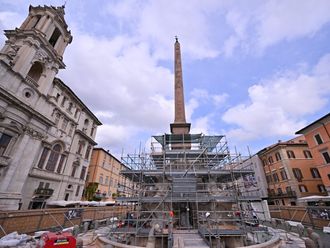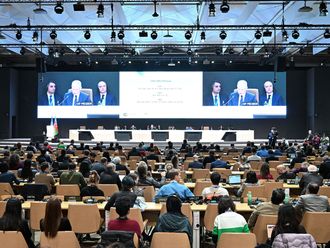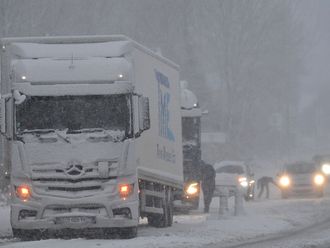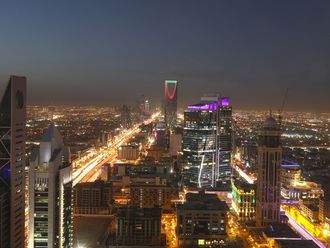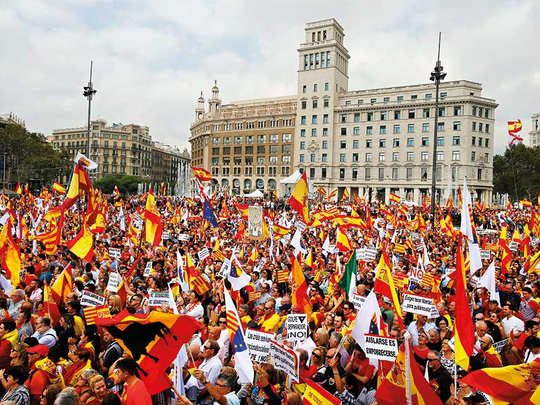
MADRID: Spain marks its national day Thursday with a show of unity in the face of Catalan independence efforts, a day after the central government gave the region’s separatist leader a deadline to abandon all plans of secession.
The country is suffering its worst political crisis in a generation after separatists in the wealthy northeastern region voted in a banned referendum on October 1 to split from Spain.
To mark the national holiday, Prime Minister Mariano Rajoy and King Felipe VI are due to attend a traditional military parade in central Madrid, where red and yellow Spanish flags have been tied to balconies and windows by pro-unity supporters.
A Spanish Eurofighter jet crashed on Thursday after taking part in a military display in Madrid for Spain’s national day, killing its pilot, the defence ministry said.
“As a result of the accident, the pilot of the plane that crashed on its approach to landing has died,” the ministry said in a statement.
It said the Eurofighter went down near a military base at Albacete, 300km southeast of the capital.
A parachutist with a large Spanish flag floats down during a military parade in Madrid, Spain |
The Twitter account for the defence ministry’s chief of staff confirmed the pilot’s death.
“Rest in peace, comrade. Thank you for helping us to celebrate the day you have given your life for. We won’t forget you,” it said, posting an image of the Spanish flag pinned with a black ribbon.
A Eurofighter last crashed in Spain in June 2014, killing the pilot when it ploughed into grass short of the runway at the Moron air force base near Seville.
Spain’s national day marks the date that Christopher Columbus first arrived in the Americas in 1492.
It falls this year in the middle of Spain’s biggest political crisis in a decade as Catalonia’s separatist leader is threatening to split the region from the rest of the country.
A traditional military parade took place in Madrid, with fighter jets, military planes and helicopters making several fly-bys.
Armed forces will march down Madrid’s Paseo de la Castellana boulevard to mark the day that Christopher Columbus first arrived in the Americas in 1492 while pro-unity rallies, including one by members of the far-right, are planned in the Catalan capital Barcelona.
Rajoy has vowed to do everything in his power to prevent Catalan secession and his government said Wednesday that it would take control of the region if it insisted on breaking away.
Warning
The warning came after Catalonia’s president Carles Puigdemont announced Tuesday that he had accepted the mandate for “Catalonia to become an independent state.” He signed an independence declaration but asked regional lawmakers to suspend it to allow for dialogue with Madrid.
The legal validity of the declaration was unclear.
After holding an emergency cabinet meeting, Rajoy told lawmakers that Puigdemont had until next Monday to decide if he planned to push ahead with secession and then until next Thursday to reconsider, otherwise Madrid would suspend Catalonia’s regional autonomy.
The deadline set the clock ticking on Spain’s most serious political emergency since its return to democracy four decades ago.
World leaders are watching closely and uncertainty over the fate of the region of 7.5 million people has damaged business confidence, with several listed firms already moving their legal headquarters out of Catalonia.
The region itself is deeply divided on the issue, with polls suggesting Catalans are roughly evenly split on whether to go it alone.
While Puigdemont insists the October 1 referendum gave him a mandate for independence and has said he still wants dialogue with Madrid, Rajoy has refused to negotiate on anything until the separatists abandon their independence drive. He has also rejected calls for mediation.
No mediation
“There is no mediation possible between democratic law and disobedience, illegality,” he told parliament.
Rajoy’s government on Wednesday said it was triggering constitutional article 155, which allows Madrid to impose control over its devolved regions — an unprecedented move that some fear could lead to unrest.
“We ask for dialogue and the answer by putting article 155 on the table. Understood,” Puigdemont tweeted late Wednesday.
Spanish foreign minister Alfonso Dastis said in an interview Tuesday that the government would push ahead with article 155 powers “with prudence and proportionality.”
While separatist leaders say 90 per cent of voters opted to split from Spain in the unofficial October referendum, less than half of the region’s eligible voters actually turned out.
The Catalonian separatist drive has raised concern for stability in a European Union still coming to terms with Britain’s shock decision to leave the bloc, and Brussels has urged “full respect of the Spanish constitutional order”.
Catalonia, which accounts for about one-fifth of Spain’s economic output, already enjoys significant powers over matters such as education and health care.
But Spain’s economic strains during the world’s financial crisis have helped push the cause of secession from the fringes of Catalan politics to centre stage.
Separatists say Catalonia pays more in taxes than it receives in investments and transfers from Madrid.
Puigdemont insisted Wednesday that “the majority of Catalan people want Catalonia as an independent state” but Rajoy dismissed his plan as “a fairy tale”.
“It is not peaceful, it is not free, it will not be recognised by Europe and now everyone knows it will have costs,” he told lawmakers.


